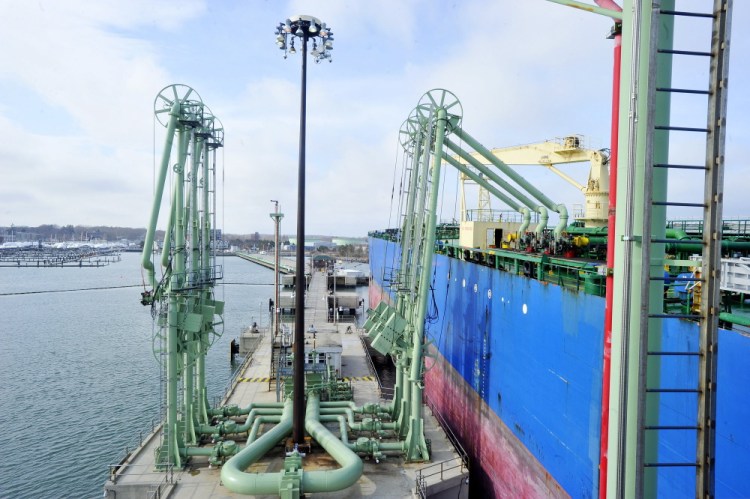SOUTH PORTLAND — The Portland Pipe Line Corp. says that more than 100,000 barrels of crude oil from western Canada would be available to be shipped daily from Montreal to South Portland if the company were allowed to reverse the flow of its pipeline.
It’s the first time the company has publicly disclosed how much oil might come from Canada since it filed a federal lawsuit challenging the city’s 2014 ban on loading crude into tankers on South Portland’s waterfront.
The city’s attorneys contested the late submission of new information included in written testimony by pipeline President Thomas Hardison. But on Tuesday, Judge John Woodcock Jr. denied the city’s motion to dismiss Hardison’s testimony and any documentation backing it up.
“Hardison contended that (Canadian suppliers) can make available over 100,000 barrels per day in volume in addition to what (Canadian refineries) currently transport,” Woodcock wrote in his order. “Hardison therefore concluded that there is sufficient volume available (from Canadian suppliers) to support a successful flow reversal project.”
Hardison was scheduled to deliver his testimony in person Wednesday in U.S. District Court in Portland.
If the pipeline did transport as much as 100,000 barrels per day, or 36.5 million barrels per year, south from Montreal to South Portland, that’s less than a quarter of the 160 million barrels of foreign crude that flowed north through the pipeline in 2004.
Filed in February 2015, the company’s lawsuit challenges the so-called Clear Skies ordinance that was approved by the City Council in July 2014. The ordinance banned the loading of crude oil into tankers on the city’s waterfront, effectively blocking the company from reversing the pipeline’s flow to bring oil from Canada to South Portland.
A Canadian-owned subsidiary of ExxonMobil and Suncor Energy, the company operates an underground pipeline that transports foreign crude oil from its harbor terminal in South Portland to refineries in Montreal. The 75-year-old pipeline has been largely shut down in the last year or so for lack of demand because the refineries have been drawing crude from western Canada and North Dakota.
The lawsuit claims that the city’s crude export ban is unconstitutional because it interferes with interstate trade, discriminates against Canadian interests, devalues the pipeline and infringes on areas of regulation best left to the federal government.
The city claims the company’s lawsuit is groundless because it had no plan to reverse the flow of the pipeline when the council approved the ordinance “to protect the health and welfare of (city) residents and visitors and traditional land use authority to promote future development consistent with the comprehensive plan,” according to court documents.
However, the company has moved to reverse the pipeline’s flow in the past. The flow of one of the company’s two pipelines was reversed from 1987 to 1999 to transport natural gas to South Portland, an attorney for the company testified last year.
In 2008 and 2009, the company secured local, state and federal permits and approvals that would have allowed the same pipeline to transport crude oil to South Portland. The $2.3 million project never happened and the permits have since expired or been revoked or surrendered, according to court testimony and documents.
The attorney testified that the company cannot submit plans or pursue permits to reverse the pipeline’s flow because it would be an illegal operation under the city’s ban. If the ban were overturned, the company would use plans developed nearly a decade ago but never used.
A key issue for the court is the city’s claim – backed by testimony from an oil industry expert – that the company couldn’t show there is a sufficient supply of crude oil in Canada to make it viable to reverse the pipeline’s flow.
The city’s attorneys asked Woodcock to dismiss Hardison’s 100,000-barrel claim because, in part, the company failed to produce flow data either during discovery or when the city asked for it later on two separate occasions.
However, Woodcock noted that the city had asked whether the company had “projections” for how much oil would be available to the pipeline, not whether the company had any documents showing the volume “actually” available.
The city also questioned the validity of Hardison’s testimony without detailed supporting data, but the judge found that his testimony was “rationally based on his perception” as a longtime employee and executive with access to the company’s flow data.
The city has asked Woodcock to dismiss the case. Whatever the outcome in U.S. District Court, the case will likely wind up in the 1st U.S. Circuit Court of Appeals in Boston.
The lawsuit had cost the city more than $1 million in legal fees through December 2016. A more current figure was unavailable Wednesday.
Kelley Bouchard can be contacted at:
kbouchard@pressherald.com
Send questions/comments to the editors.




Comments are no longer available on this story